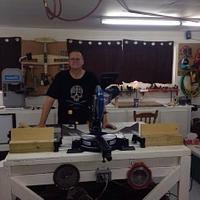32 Replies
Jack,
We’re not quite certain but we grounded our whole system just in case. Better safe than sorry!
L/W
“Those who would give up essential Liberty, to purchase a little temporary Safety, deserve neither Liberty nor Safety.” Benjamin Franklin
Static electricity does create sparks when a discharge occurs so grounding is good. Depending on how much electric charge accumulate, the sparks are more powerful.
I have not grounded my dust collection system and I do receive a shock or 2 when I get very close the clear hose.
I always swipe the floor every time I see dust accumulating.
I have a fire extinguisher within reach. Probably is not going to help me much when disaster strikes.
Abbas, Castro Valley, CA
You really only need 3 things to have a fire or explosion, they are: 1) heat. 2) fuel. 3) oxygen. So even without the spark their is a potential for fire or worse. By running a dust collection system you collect the fuel out of the air and it gets cooled in the air moving fast. Any and all equipment in a woodworking environment should be grounded. Fire extinguishers and sprinklers systems are great things to have. The best tool to have to prevent a dangerous situation is common sence. It’s not that common either, but if you have a cloud of dust and open sparks or static sparks are in that room filled with dust it could be dangerous. Like when using a table saw, always try to think of the worst “what If”.
CHRIS, Charlottetown PEI Canada. Anytime you can repurpose, reuse, or recycle, everyone wins!
Also, here is something to consider…every electrical motor produces sparks while running, so a highly flammable oxygen rich environment, has a potential for fire or worse.
CHRIS, Charlottetown PEI Canada. Anytime you can repurpose, reuse, or recycle, everyone wins!
I agree with Thorrean.
Disclaimer I am NOT an expert (of anything), but I am an industrial electrician with some experience with grounding massive dust collection systems.
When I built my shop I took some time to research dust explosions more carefully.
It is a risk albeit small, in small shops. the risk is actually higher when you are sweeping. It is all about the fuel/air ratio, which is usually low in a small shop. If you keep your shop well swept and dont let the dust pile up you’ll be fine. Grounding is ALWAYS a good idea but I strongly suggest driving a separate ground rod and grounding everything to that. Dont rely on the ground from your panel as that (in rare cases) can actually introduce electrical energy to the wire. (That is actually the purpose of the grounded conductor).
research dust explosions, there are a lot of good resources online (youtube)
Knowledge is power.
Grounding 101: route a solid BARE ground wire, 12 gauge is usually sufficient for small shops, INSIDE the dust collection hose, duct, raceway, etc and bond to a metal portion of each machine. You will want to make splices outside of the duct otherwise it will cause a clog later. route around any blast gates.
route ground wire back to ground rod.
That is the simplest fix to mitigate static. will cost you an afternoon and usually less than 150-200 bucks.
I agree that grounding is a good idea. A air cleaner helps to remove dangerous dust particles from the air and reduces accumulated dust on machines & floor. Never use a air line to blow clean your shop as the air/fuel mixture will be a perfect combination for a explosion
Daba
Spending the afternoon grounding the shop. Also noticed I have gotten a little careless with my old rags that could also be a problem. Much gratitude to all you nice people for all the tips and ideas.
Jack
When grounding the panel for my shop I used a 2" thick plate copper, buried 3 feet down. I used a piece of 10 gauge ground wire connected with all copper fittings. The plate is also connected to an old well with a iron casing. At the time copper was not the price it is now. I suspect the $300 I spent doing it now would be close to $1000, or maybe a lot more. As well every outlet has its own breaker and ground. Each outlet box is also grounded and then the whole thing is double wrapped in poly and taped so its air tight. Many would have said its overkill, but it’s my shop and ill cry if I want to….lol
CHRIS, Charlottetown PEI Canada. Anytime you can repurpose, reuse, or recycle, everyone wins!
We grounded our hose and pipe (PVC) inside as Jeff said, but what I don’t understand is why some claim the hose is already grounded. I don’t understand how the wire — totally encapsulated in plastic and then attached to a plastic fitting — works as a ground. Can anyone explain?
“Those who would give up essential Liberty, to purchase a little temporary Safety, deserve neither Liberty nor Safety.” Benjamin Franklin
short story. it isnt. you would have to expose the wire inside the flex and use it as a wire. technically it has a ground wire but its useless.
As Jeff said, BARE wire is a proper ground wire. Even inside the hose it must be bare copper wire. No jacket no plastic, and grounded to the actual ground wire. Then the devise itself, the bare wire must be attacked to the metal on the frame. Most don’t have that luxury tho as they have machines on wheels cause space is at a premium and tools are on wheels. However any stationary tool can and should be grounded besides the ground on the cord. That’s what I do. My dust collection is only a shop vac, for now. But I have plans for a plenum fan, and, a hose system. They will have overkill grounding too. But then again my carrier as a fire trainer and qualifications as an electrical engineer have made me zealous as a proponent of fire safety.
CHRIS, Charlottetown PEI Canada. Anytime you can repurpose, reuse, or recycle, everyone wins!
FYI LWLL pvc is probably the worst material possible for creating static. I would suggest considering replacing it if you notice issues.
There have been some pretty fascinating discussions about this over at LJ. I’m in the camp that there is pretty much zero risk until you step up toward industrial sized collection. The main idea being that there has to be a certain volume of both air and fuel to reach a sort of critical mass that you just can’t get from small dc units. Certainly not from the shop vac setup in using, but even from anything with 6" ducting.
There are plenty of other risks associated with DC but combustion caused by static discharge isn’t one of them. And always always always ground all of your equipment and outlets properly.
Losing fingers since 1969
I’m with Brian…. Never heard of a problem. But lots of discussion about it.
Dan Gagner, Craftsman on the lake. The lake is calm, the wife is understanding, the wood is dry. What more is there...
Put another one on the list of “no problem”. There are a lot of other things (safety wise) to worry about in a wood shop, grounding the DC isn’t one of them. Pus, when you make changes to the ductwork (and you will do that) it becomes a huge PITA to deal with.
"I long for the day when coke was a cola and a joint was a bad place to be" Merle Haggartd
For anyone thinking that explosion risk from a dust collection system is not fact, or that grounding is not required I advise you to read the NFPA material on this issue. The NFPA only writes rules based on deaths. If you want to learn more go to http://www.nordfab.com/wp-content/uploads/2013/03/GaryJohnsonArticle.pdf
The article is written for businesses, however the principals that relate to explosion apply to any size machine.
CHRIS, Charlottetown PEI Canada. Anytime you can repurpose, reuse, or recycle, everyone wins!
Page 1 refers to MEC: minimum explosiible concentration. You just can’t reach MEC for saw dust in a small shop environment. The duct must be large and a LOT of dust has to be traveling through it, relatively equally spaced inside the volume of the duct. That’s why the risk is nil for small harbor freight sized DC united and shop vac based collectors. It’s not the dust in the can that is a problem. It’s the dust in the duct picking up static electricity as it moves.
I get static all the time on my mini collector. But it discharges on me usually. The stuff that goes into the can is more of a concern. Snell smoke when you’re cutting something? Hit a screw with the blade? Watch out for embers. Hehe.. Once I was pushing something on the router too hard doing something I shouldn’t have been doing and I started seeing red embers fly into the DC. LOL that batch went outside after that.
Didn’t someone wire a song about that? All it takes is dust in the wind… :-)
Losing fingers since 1969
Brian I tend to agree with you. The needed fuel air ratio would be difficult to reach in a small shop. However, with such a small investment of time and money to decrease those odds even further, why not?
I always say, no arc is a good arc! Unless you’re Noah or maybe welding. But you shouldn’t be welding in a dusty, wood scrap covered woodworking shop in the first place!
Keep everything properly grounded.
Losing fingers since 1969
Here’s an interesting read. I ran across this while looking for laboratory results documenting MEC for sawdust (which I still haven’t found – I need to hone my Google-jitsu skills).
Losing fingers since 1969
I don’t want to stir the pot but I don’t see any reference to back any of the argument in the wood nerd article.
Whenever I have an anonymous author I usually stay clear.
The argument that he never heard of even one explosion is probably true in his neighborhood. Maybe it should read his has never run across any data that document even one.
Like I said I don’t have grounding on my dust duct in my shop and won’t have any since everything is movable. In addition the flexible hose run is very short.
Having grounding will add a small complexity to my setup I am not keen on having at the moment.
When I get to have all my machines stationary I will definitely do that even just to avoid that unpleasant discharge.
Abbas, Castro Valley, CA
The sad news is, there used to be over thirty-seven thousand of us on this forum, but most had dust collection systems in dry climates, so are gone now and we are down to a [large] handful of sawdust manufacturers.
Okay, maybe, that isn’t true. When is the last time you heard of one of us blown up by our 5hp, or less collectors? That you and others cannot publish an actual public record regarding such should result in a fair amount of comfort.
Of course, you may be the fist. Just in case, could you move your more valuable toys to a safer location.
Too, please do not be concerned with that your heirs might sell your tools for what you told your wife you paid for them. Just consider it your good deed before the big event.
One thing is for sure: this is an incredibly fascinating subject and I enjoy reading everyone’s thoughts.
It’s hard to find scientific data on the subject mainly I think because no one is concerned with small shops. Insurance companies and testing laboratories focus on industrial applications because nobody is paying them to look at small setups. It would be interesting to see if companies that sell small setups, like Oneida, have done any research into the matter. I think they would have an interest in it from a product liability viewpoint.
If not, or if they don’t release it publicly, we could be spinning our wheels on the subject for years. (Or spinning our impellers? )
Losing fingers since 1969
Great guys thank you. And Kelly you nailed me on the cost of my toys in the shop. I always lose the receipt before I bring them home. The thought of them being sold for those cheap prices, now you have given me something else to worry about.
Jack
I think if you go on youtube you can find the episode of Mythbusters where they address this problem and find out that it was bunk. I’ve been working full time in my shop for ten years and have had no problems with a combustion problem. Now with that being said anything is possible lol. Hope it will help
I searched myth busters dust explosion and this came up: http://youtu.be/yRw4ZRqmxOc
It’s a little different concept, but big boom.
Losing fingers since 1969
Brian, this is, precisely, why I quit vacuuming all the spilled dairy creamer.
Simple searches will reveal explosions to be a significant danger in grain storage bins. However, just sitting, the grain poses no threat. Only when being moved, which caused a lot of dust and chaff to be made airborne, does the danger come about. Even then, the density of the dust in the air will determine the danger.
Throwing a full bag of sawdust in a wood stove poses no danger, but dumping the contents can be nasty. That even applies to dust from metal work.
Let me weigh in on this. I was a firefighter for 32 years and have been a woodworker just as long. Dust explosions in a home shop environment are 99.99999% nonexistent, they simply do not happen. Even in industrial settings they are rare. The vast majority of the industrial fires are caused by sparks from malfunctioning equipment, ie seized bearings. Dust collection systems over 5000 cfm do require specific grounding and spark arresting technology as well as suppression systems.
Grounding a home/hobby shop dust collection system is only to alleviate nuisance static electricity that feels uncomfortable. There’s no danger of causing a fire or explosion. Years ago I tried running a bare copper wire through the piping I was using and had far more problems with clogging than any benefit I might have derived. I don’t recommend it.
Artisan Woodworks of Texas- www.awwtx.com
Bill thanks for the input. Quite frankly, without ever having met you, I have more faith in your statement than “mythbusters” and their “scientific” method.
Although, I do love watching the show.
If you’re really concerned with grounding, then you should just go work all metal ductwork and be done with it. The link I posted explains why attempting to ground PVC is futile. But metal is very easy to ground and it’s really the only way to go to do it properly.
Losing fingers since 1969
What Brian said….+1. If you really want to waste your time with grounding, go with metal duct.
"I long for the day when coke was a cola and a joint was a bad place to be" Merle Haggartd
















